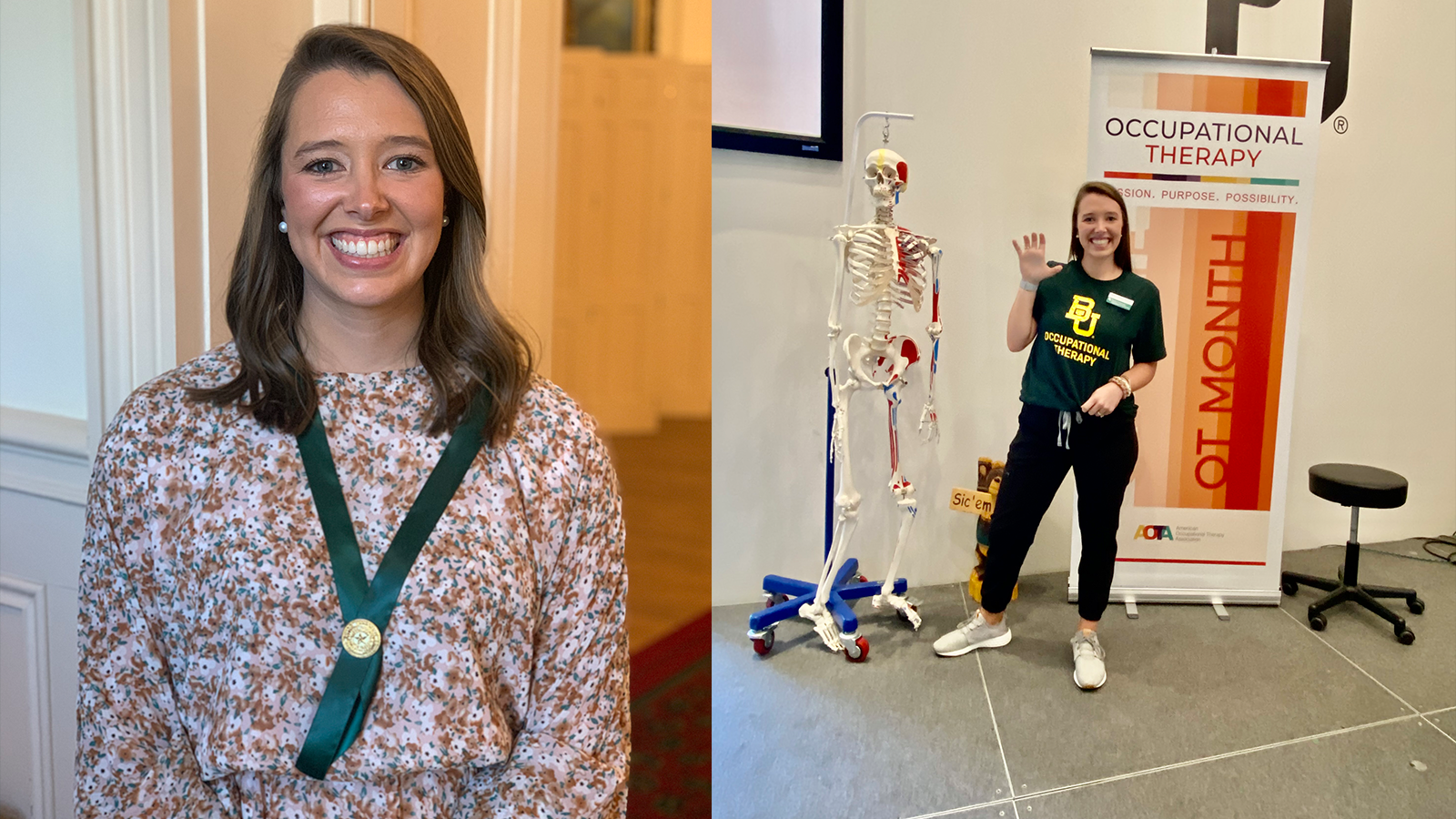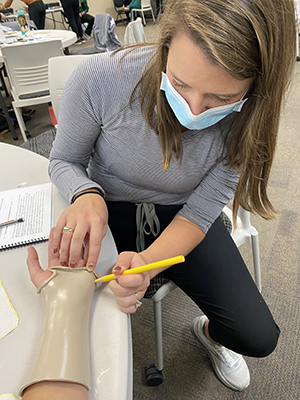Meet the First Graduate of Baylor’s Entry-level Doctor of Occupational Therapy Program

On December 17, 2022, Baylor University’s Entry-level Doctor of Occupational Therapy (OTD) program will graduate its inaugural class. This two-year program, housed in the Robbins College of Health and Human Sciences, embraces a student-centered approach to developing a cohort of learners with a focus on critical thinking, values, and social responsibility, learning goals, and experiential learning.
Thanks to a last name that is alphabetically first in line, Kellam Addison McQuitty will become the very first Entry-level OTD graduate when she crosses the commencement stage. In this Q&A, Kellam shares about her experience as a student and the foundational contributions she and her classmates made to an already exceptional occupational therapy program.
How did you initially become interested in the field of occupational therapy?
A lot of different things led to my interest in occupational therapy. It started when I was in high school. My father was diagnosed with Parkinson’s at a young age, so that got me into the rehab field early. I was really interested in what his doctors and therapists were doing. That was the initial push. I also did ballet for 17 years and was an athletic trainer in high school, so understanding human anatomy was really interesting to me as well.
Then, when I went to college, I wanted to pursue exercise science. As I got further in the exercise science program, I started researching different rehab fields that I could go into after undergrad. I applied to both occupational therapy and physical therapy programs, but I wasn’t really particular about which one I wanted to go into. But when I got into OT school, I knew that was exactly where I was supposed to be and what I was led to do. I like that it’s goal-oriented and that you’re able to work with patients with a holistic view.
Why did you choose the Baylor OTD program?
I honestly think it was a God thing. It was perfect timing. I was nervous applying, and when I got in, I was wondering if it was what I was supposed to pursue. Then, I connected with one of the faculty members, Dr. Barbara Doucet, and she had very similar interests and background to me. She’s done a lot of research in the Parkinson’s field. I talked to her a lot before I accepted, and it was really encouraging for me to see her passion for the field. I could tell from the beginning that all of the Baylor faculty are very caring about their students, which was a big thing for me.
My husband is military, and we’re stationed in Fort Hood, Texas. I found out that I got into the program two days after he was deployed. The accelerated, hybrid nature of the program was really important in my decision as well. Right when I’m finishing the program is right before we’re set to move from Texas, so it was perfect timing. Like I said, it was a God thing.
Did you have any hesitancies about being a part of the inaugural cohort for the program?
Not really. Honestly, it made me more excited! I love tradition, and I knew that being a part of the first cohort would allow me to help set those traditions for the program going forward. And Baylor already has some awesome traditions as well. It was really interesting and fun to be a part of all of that.
What has it looked like to be a part of the first class? Have you been able to set some of those traditions?
Definitely! I was voted as vice president for our class, and I’ve really enjoyed that position. It’s been nice to be that middle person for our cohort and for the faculty. I get to talk to both sides and understand what my classmates want in the program and how our faculty are feeling. One of the biggest traditions that we’ve helped set up is the pinning ceremony. We had a lot of say into what we wanted for the ceremony and how we can set that tradition, which has been awesome.
We also helped establish our official student organization. In occupational therapy, we have something called the Student Occupational Therapy Association (SOTA). Nearly every program in the OT profession has one, but a lot of first year programs don’t start them immediately because they are student-run and it’s not really expected in that first year. But we were able to get ours up and running, which has been so great. It was really rewarding to see the whole process come together with our faculty’s help and support.
What’s next for you after graduation?
I’m studying for the licensure exam right now, but it’s going really well. Baylor did an awesome job preparing us in all of the different OT domains to be ready for the exam. They also prepared us with our fieldwork experiences and really went above and beyond to get us into different settings for our rotations. I was able to do a pediatric rotation and a hand rotation, which as I’m studying and looking at the board material, I feel like really helped prepare me.
My first rotation and my capstone were at the same facility, which is not very typical. But I was able to start building a relationship with them on my first rotation and then come back for my last one. And now I’ve just accepted a job there in outpatient hands therapy. I’m very excited!
Is there anything else you would like to share about the Baylor Entry-level OTD program?
I would just say that I’m very thankful for the Baylor experience. My teachers have been amazing. They are just overall really supportive. My biggest struggle throughout the program was having my husband deployed for almost the entire first year of school, and then my dad was also going through a really big brain surgery. Both my class and my teachers really lifted me up in prayer that whole time, and they were very supportive. Dr. Doucet, whom I had initially connected with, was reaching out daily to ask how my dad was doing and added me to her church’s prayer list. Everyone was just really supportive, and that was the icing on the cake for Baylor for me.
